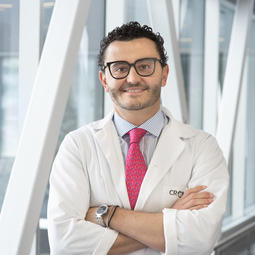13:00 - 14:00
ET
Webcast
How your gut health can affect your blood cancer treatment and quality of life
Innovation in Research
The community of microbes (bacteria, fungi, viruses and their genes) living within our digestive tracts - known as the “gut microbiome” - can play a role in blood cancer treatment. Join us to learn more about this exciting area of research with a live presentation by an international leader in the study of gut microbiome!
Join us to learn topics including:
- What you eat can change your gut microbiome, which in turn can affect your response to therapy
- How changing your microbiome can help fight resistance to key regulators of your immune system, and how clinical oncology practice was changed as the result of some of Dr. Rouy’s work in this area.
- Microbiome-centre clinical trials are focused on turning laboratory findings into clinical applications.
- What does this area of research mean for better treatment and better quality of life for Canadians affected by a blood cancer.

Dr. Bertrand Routy, MD, PhD
Dr. Routy is a clinician-scientist and associate professor in the department of hemato-oncology at the CHUM (University of Montreal). Upon his recruitment to the CRCHUM in 2018 after completing his PhD with Dr. Laurence Zitvogel, Dr. Routy quickly established himself as the scientific director of the CHUM Microbiome Centre where he began his work to develop novel microbiome-based therapeutics in oncology.
His work contributed to the discovery of the gut microbiome as a novel prognostic biomarker for immune checkpoint inhibitors (ICI) in various cancers. He characterized the deleterious impact of antibiotic-related gut dysbiosis on ICI outcomes, which led to pivotal changes in clinical oncology practice. Dr. Routy has demonstrated that modulation of the microbiome by fecal microbiota transplantation, probiotics, and prebiotic supplementation had the potential to circumvent ICI resistance. His team currently leads several microbiota-centered trials in oncology ranging from phase I to phase II trials, with the aim of decreasing primary ICI resistance.
His work contributed to the discovery of the gut microbiome as a novel prognostic biomarker for immune checkpoint inhibitors (ICI) in various cancers. He characterized the deleterious impact of antibiotic-related gut dysbiosis on ICI outcomes, which led to pivotal changes in clinical oncology practice. Dr. Routy has demonstrated that modulation of the microbiome by fecal microbiota transplantation, probiotics, and prebiotic supplementation had the potential to circumvent ICI resistance. His team currently leads several microbiota-centered trials in oncology ranging from phase I to phase II trials, with the aim of decreasing primary ICI resistance.
